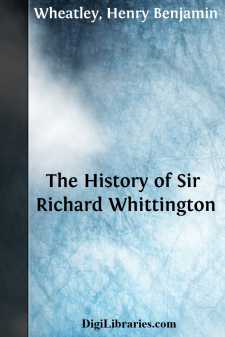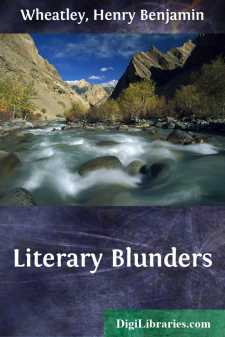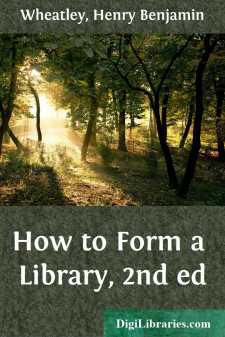Categories
- Antiques & Collectibles 13
- Architecture 36
- Art 48
- Bibles 22
- Biography & Autobiography 813
- Body, Mind & Spirit 142
- Business & Economics 28
- Children's Books 15
- Children's Fiction 12
- Computers 4
- Cooking 94
- Crafts & Hobbies 4
- Drama 346
- Education 46
- Family & Relationships 57
- Fiction 11829
- Games 19
- Gardening 17
- Health & Fitness 34
- History 1377
- House & Home 1
- Humor 147
- Juvenile Fiction 1873
- Juvenile Nonfiction 202
- Language Arts & Disciplines 88
- Law 16
- Literary Collections 686
- Literary Criticism 179
- Mathematics 13
- Medical 41
- Music 40
- Nature 179
- Non-Classifiable 1768
- Performing Arts 7
- Periodicals 1453
- Philosophy 64
- Photography 2
- Poetry 896
- Political Science 203
- Psychology 42
- Reference 154
- Religion 513
- Science 126
- Self-Help 84
- Social Science 81
- Sports & Recreation 34
- Study Aids 3
- Technology & Engineering 59
- Transportation 23
- Travel 463
- True Crime 29
Henry Benjamin Wheatley
Henry Benjamin Wheatley (1838–1917) was a British bibliographer, editor, and writer known for his contributions to literary and historical scholarship. He edited several important works, including Samuel Pepys' "Diary" and produced "What is an Index?" and "How to Form a Library," reflecting his expertise in bibliography and cataloging. Wheatley was also instrumental in the creation of the Early English Text Society, which promoted the publication of early English literature. His meticulous work in the field of indexing and bibliographic research earned him a distinguished place in literary circles.
Author's Books:
Sort by:
Introduction. The popular story of Whittington and his Cat is one in which a version of a wide-spread folk-tale has been grafted upon the history of the life of an historical character, and in the later versions the historical incidents have been more and more eliminated. The three chief points in the chap-book story are, 1, the poor parentage of the hero; 2, his change of mind at Highgate Hill by...
more...
1881. Question 1.—Sound is said to travel about four times as fast in water as in air. How has this been proved? State your reasons for thinking whether sound travels faster or slower in oil than in water. <p 184> Answer(a).—Mr. Colladon, a gentleman who happened to have a boat, wrote to a friend called Mr. Sturm to borrow another boat and row out on the other side of the lake, first...
more...
PREFACE. It will be generally allowed that a handy guide to the formation of libraries is required, but it may be that the difficulty of doing justice to so large a subject has prevented those who felt the want from attempting to fill it. I hope therefore that it will not be considered that I have shown temerity by stepping into the vacant place. I cannot hope to have done full justice to so important...
more...




